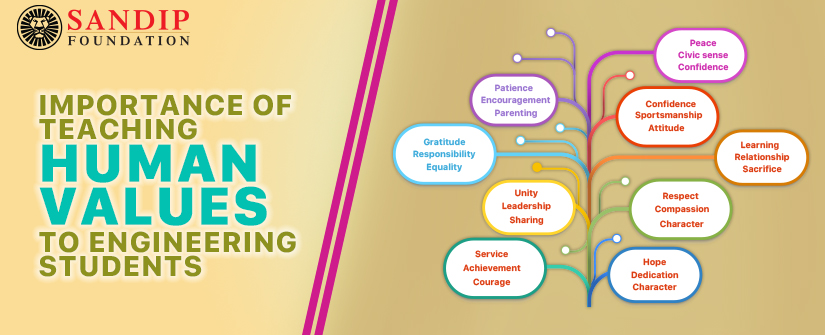Human values are an important part and parcel of engineering education, even though it may seem that humanities and engineering are at the opposite ends of a learning spectrum. Some of the best engineering colleges in Nashik integrate the learning of human values and humanities in the course curriculum of their engineering programs. This is done to provide students with a humanitarian approach to technical education. While this is a recent development in engineering education, the need for such an initiative has been imminent.
Here’s how teaching human values to engineering students impacts their personal and professional outlook as engineers:
- Enhanced Work Ethics
Engineering is a serious profession, where the room for error or careless work is negligible. Engineers who are taught human values have been known to display strong work ethics, which in turn enhance their performance as engineers. Professionals with good work ethics display higher ethical standards towards their organisation, colleagues and the work at hand. They are extremely professional when dealing with tough situations at work and are able to better understand interpersonal relationships in the work space. They also display better humanity when faced with morally challenging problems, making them better workers and people at large.
- Sense of Societal Responsibility
Society is intricately dependent on responsible engineers. Engineers work in diverse fields to make lives easier for us as consumers of their creations. For example, a civil engineer who designs and constructs a bridge helps people commute with ease from one place to another. If that engineer accepts bribes or uses sub-standard goods to construct that bridge, it would put people’s lives at risk. Engineers with qualifications from engineering science and humanities colleges in Maharashtra are trained to behave responsibly towards the society when working on a project. They understand the impact of their actions and so engage in a manner that is for the greater good of the society.
- Valuing Life & Nature
Engineers work in fields like environmental science, chemical engineering and biotechnology, which are deeply connected to life and nature. An ethically-aware engineer is trained to value life above all else when making decisions at work. They would refrain from making decisions that could harm human life or nature in the grand scheme of things. Such engineers understand and respect the laws of nature and work for the betterment and preservation of nature and life. An engineer who has tremendous knowledge and skills without human values can become a threat to society and nature. Hence, humanity and responsibility have to be at the core of every engineer’s training.
- Respecting Time
Respecting time is important for professionals in most fields, but all the more important for engineers. Engineers are often-times tasked with projects that impact society and need to be completed in time. Many humanities and social science colleges in Nashik train students to understand and appreciate the value of time management in their professional lives. An engineer who values time will value the trust bestowed upon him by his organisation and complete the tasks on time. This in turn will help the business grow and thrive against competition within the global market space.
- Ethical Approach to Technology
Engineers and technology go hand-in-hand. Engineers are constantly developing and innovating newer, better and faster technology. However, an engineer who does not respect humanity can end up developing technology that can harm human lives in the long run. The world needs engineers who understand that technology needs to be treated with caution and that human life is sacred. No amount of technological advancement can triumph over the sanctity of human life and nature. Hence, it is important for engineers to adopt an ethical approach to technology in order to preserve lives.
Conclusion
The above points illustrate the importance of instilling human values in engineers. Many top engineering colleges in Maharashtra offer cutting-edge programs that balance teaching engineering with ethical and human values. This is the need of the hour as the world is developing at a break-neck pace and we need to have ethically and morally responsible engineers leading such development. Hopefully, the coming generations of engineers will inculcate such human values in their personal and professional lives.

